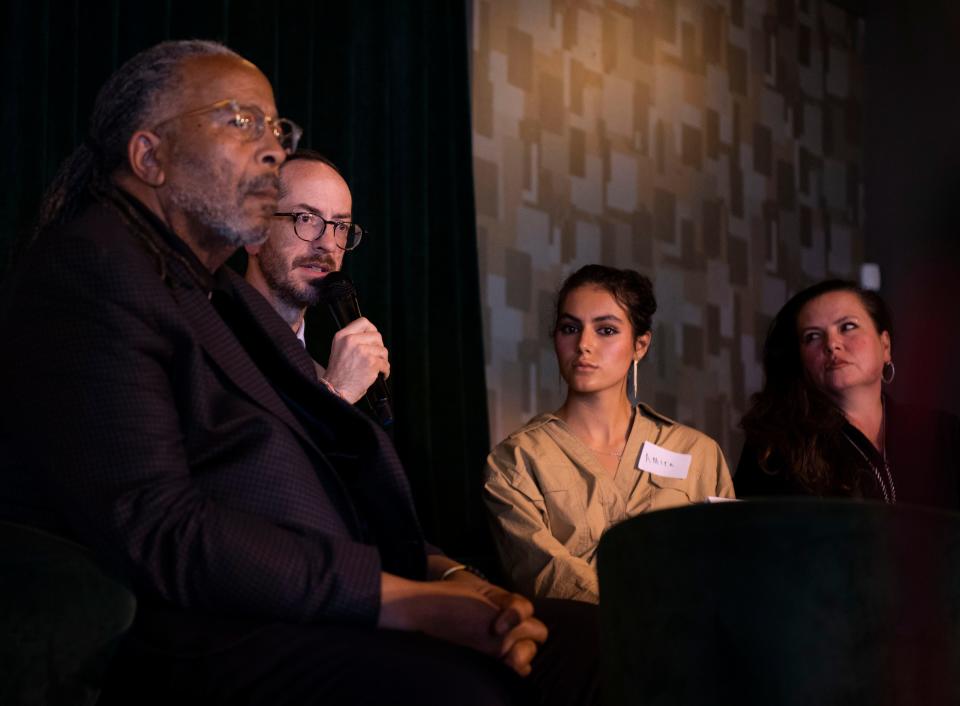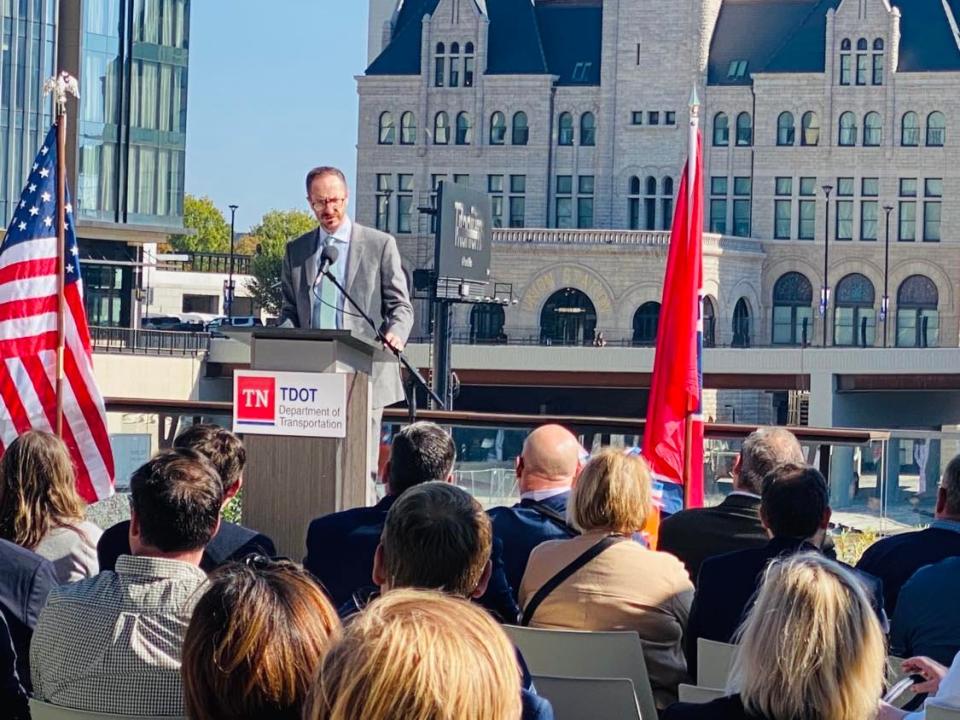New Nashville mayor charts course with big transit decision looming
Weighty decisions are on the horizon for Nashville's new Mayor Freddie O'Connell.
In his first two months in office, O'Connell grew his team, kept a vigorous public appearance schedule and navigated the launch of East Bank negotiations, legal battles and victories against the state, the deep local impact of the ongoing Israel-Hamas war and a community grieving the shooting death of Belmont student Jillian Ludwig.
Meanwhile, his transition team has been hard at work on policy recommendations they will present Tuesday, including one urging O'Connell to make an early decision about whether to push for a November 2024 referendum vote on dedicated transit funding.
Building a transit network with frequent, reliable service in Nashville tops O'Connell's campaign list of "15 fixes" he pledged to start working toward on "day one." His transition committee spent the last 60 days speaking to city leaders and community members, using the 15 fixes as a benchmark to develop policy suggestions to bolster Nashville's growth, transportation infrastructure and customer service.

The war brought an early and painful lesson for O'Connell: "Nashville's success in being a diverse and globally connected city means that events half a world away can really cause local pain," he told The Tennessean in mid-November. It drove home the importance of Nashville as a "second responder" tasked with providing resources to constituents suffering through tragedy.
"There's never a period where we don't have to be ready for multiple crises in a day or a week, so making sure we have that capacity and thinking about our resiliency as a city is really important," he said.
When should transit be on the ballot?
O'Connell has long been known as a transit aficionado. It's not a matter of if Nashville will have a transit funding referendum under his administration — it's a matter of when.
According to policy recommendations from O'Connell's transition team, holding a transit vote during a high-turnout election "maximizes its chance of success," something learned from Nashville's failed transit referendum in 2018. One presidential election will fall during O'Connell's four-year term: November 2024.
If he chooses that path, O'Connell and his team will have to kick efforts into high gear to develop an equitable, transparent transit plan with input from transit-dependent riders, the policy brief states. They'd also need to build regional support and inclusive, independent advocacy coalitions while communicating the benefits of transit to Nashvillians throughout the county.
O'Connell said he's confident that "demand for transit in Nashville is huge," and the city is home to numerous motivated people with "exceptional talent" and expertise in mobility. Several pieces of the puzzle have been discussed at length, most recently during mayoral campaigns. They include a transit link from the airport to the city center, a frequent transit network with multiple hubs and seeking funding from the federal Infrastructure Investment and Jobs Act and Tennessee's Transportation Modernization Act.
"I think the question would be, 'could you get something together that would be reasonably costed, have a huge cost-benefit analysis advantage for the city and have regional connector opportunities?'," he said. "Are we in a position where we can apply a lot of lessons learned from the previous referendum attempt and deliver something of much greater value at much lower cost?"

A transit referendum would allow Nashville voters to approve or stop a tax increase that would provide dedicated revenue to improve Nashville's transit infrastructure. The 2018 Let's Move Nashville referendum would have increased sales tax in Davidson County by 0.5%.
But transit work is ongoing, referendum or not.
"For us, a multimodal transportation plan isn't just a master plan around public transportation," said Alex Jahangir, chair of O'Connell's "How Nashville Moves" transition subcommittee and former Nashville Metropolitan Board of Health chair. "It's safety for pedestrians (and) how we make it easy for Nashvillians to drive around our city."
Some things can be done in short order, Jahangir said. Metro can expedite the creation of more sidewalks, better lighting, safer crosswalks and more bike lanes. Metro can invest in automating traffic signals so they can be adjusted remotely in real time through Nashville's new traffic management center.
A new North Nashville transit hub will open next spring, and Metro's 2024 budget included support for new WeGo bus service to James Lawson High School and crosstown route expansion, things O'Connell said he and his Metro Council colleagues pushed for last term. In October, WeGo offered express service during Nashville Soccer Club games at Geodis Park, a first for the often-congested area.
O'Connell can also accelerate transit improvements by convening regularly with regional leaders and Metro's department heads, perhaps dedicating a member of staff to coordinating departments and tracking progress, policy recommendations state.
O'Connell said he intends to continue to personally participate in Greater Nashville Regional Council and Regional Transportation Authority meetings in addition to pre-legislative session policy discussions among the Tennessee Municipal Board.
"Across Tennessee, there are a lot of shared interests among cities, regardless of size," O'Connell said.
Policy brief: Focus on the East Bank, but not just the East Bank
Nashville's newest and largest development project features heavily in the recommendations prepared by O'Connell's "How Nashville Grows" team.
Their suggestions emphasize that O'Connell's administration should "clearly communicate" the cost to Metro for East Bank infrastructure and if and how those costs can be recovered. Development plans should be centered on the Imagine East Bank vision and not replicate downtown's entertainment district, according to the brief, and updates should be regularly communicated.
"Rather than focusing solely on maximizing city revenue, decision-makers should seek to deploy assets to meet community needs. Specifically, locating a diversity of affordable housing in the East Bank should continue to be a priority," the report states.

O'Connell tapped Nashville attorney and former Metro Council member Bob Mendes to serve as his administration's chief development officer, supervising the massive project. As a council member, Mendes was a prominent critic of Nashville's deal to build a new Titans stadium on the East Bank and demonstrated thorough knowledge of the deal's details. He has said O'Connell's administration intends to adhere closely to the Imagine East Bank vision.
More: Nashville's East Bank timeline in sight: What you can expect to see and when
But policy recommendations don't stop there.
The transition team called for investments of equal impact in neighborhoods throughout Nashville, and accessible ways for neighborhoods to communicate their needs and goals and receive updates on how their feedback is used.
"The East Bank is obviously a large project that is getting a lot of attention. It's a once-in-a-generation opportunity. But it also is and should be a prototype and a catalyst for development throughout the city that has the same kind of impact," said local attorney David Esquivel, chair of O'Connell's "How Nashville Grows" committee.
Other recommendations include:
creating a list of "concrete investments" that can be completed in the next five years based on projects already included in Metro's Capital Improvements Budget (a "wish list," of sorts, for one-time expenses).
designating a team to focus on coordinating implementation of Metro's plans, communicating progress and maintaining continuity in projects between mayoral administrations.
creating a comprehensive list of Metro-owned properties and outlining a process to determine their best use with community input.
O'Connell said he has seen some progress on the public property inventory, which will ultimately inform a "unified housing strategy" and help shape a standalone Office of Housing. The inventory is something members of the Metro Council have requested several times over the last few years. O'Connell said the inventory is more complex than a list of properties; it includes consideration of lease terms, needs for Metro office space, community needs and all possible public uses, including green space and building or maintaining housing.
The city as 'customer service'
Improvements to hubNashville — a virtual clearinghouse for Nashvillian complaints, requests and non-emergency reports — is top of mind for O'Connell's administration.
hubNashville functions as the city's "front door," where constituents are most likely to interact with their government, whether it's reporting a pothole, missed trash pickup or anything in between, the "How Nashville Works" transition committee wrote.
The solution to most complaints requires collaboration from more than one Metro department, committee chair Christy Pruitt-Haynes said. It's not residents' job to understand how Metro needs to organize its systems to fix their problem — that's on Metro.
O'Connell should foster close cooperation between city departments to make the process as seamless as possible, policy recommendations state.
An early fix: ensuring all of Metro's departments are connected to hubNashville so complaints and requests are less likely to fall through the cracks.
Nashvillians should be able to track the progress and estimated resolution of their request, and Metro should use data from the hub to identify common issues and ensure there are sufficient resources and staff to address them, the report states.
Recommendations for O'Connell's administration include:
ensuring hubNashville and other city systems are easy to access and use.
identifying and eliminating obstacles and red tape in city processes (for example, obtaining permits for projects centered on community needs).
finding new ways to more deeply engage community members in public meetings, including prioritizing convenient locations and times.
O'Connell's early hires included Keidron Turner, a constituent services coordinator who will support ongoing work at hubNashville, and Brittany Irby, who will serve as director of the Office of Neighborhoods and Community Engagement.
The transition team also emphasized the need for Metro leaders to collaborate closely on projects like the development of a Community Safety Plan (one of O'Connell's 15 fixes).
O'Connell credits former Mayor John Cooper for starting community safety programs that "have a public health dimension to them, or a community-based element … that aren't just strictly law enforcement."
O'Connell's administration has started to have conversations about shaping a coordinated public safety plan.
Overall, the recommendations encourage making the government more approachable. O'Connell said he's taken steps to increase transparency in his office through releasing his weekly schedule of public appearances and holding weekly media round tables.
His often-packed schedule is part of an effort to participate in community celebrations and more somber events throughout the county.
"It's meaningful to be not just a downtown mayor, or a 440-beltway mayor, but to be a 525-square-mile mayor," he said.
"It's very easy to get … jaded … about interacting with the government. You go in and you assume this is going to be a difficult process, and that's an unfortunate reality, or has been in the past," Pruitt-Haynes said. "But what I have learned through this is not only are all of our Nashville citizens and residents passionate about this, but all of the Metro employees, all of the departments that we spoke with, all of the data that we reviewed really show that everyone is on board with creating a best-in-class experience."
This article originally appeared on Nashville Tennessean: Nashville Mayor Freddie O'Connell faces major transit decision

